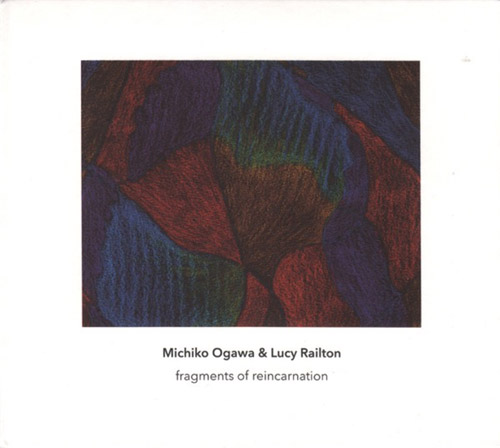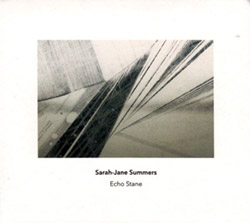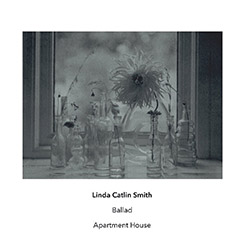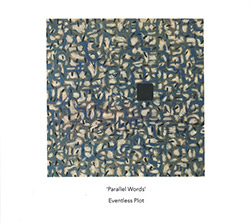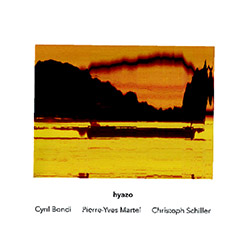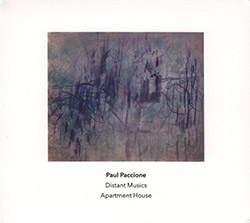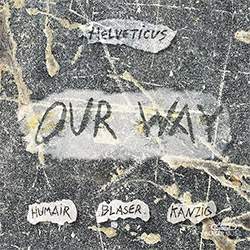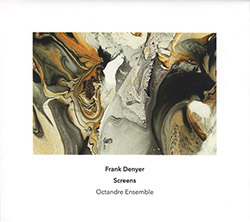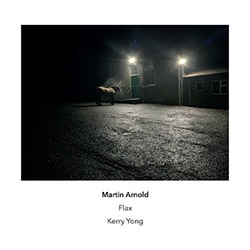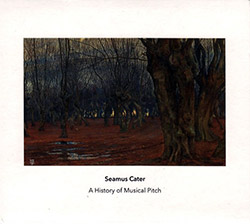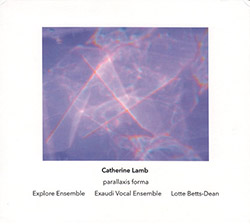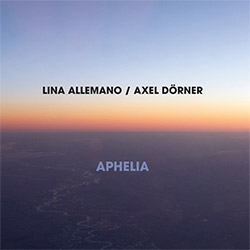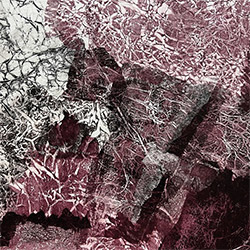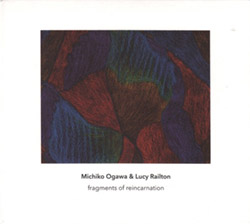
A single-movement work for sho, Hammond organ and cello, jointly realized by Berlin-based collaborators, Tokyo contemporary and experimental musician & composer Michiko Ogawa, and British cellist & composer Lucy Railton, whose work bridges experimental electronic and electroacoustic practice, here exploring the combinations of different tuning systems inherent in their instruments.
Out of Stock
Quantity in Basket: None
Log In to use our Wish List
Shipping Weight: 2.00 units
Sample The Album:
Michiko Ogawa-sho, organ
Lucy Railton-cello
Click an artist name above to see in-stock items for that artist.
Label: Another Timbre
Catalog ID: at213
Squidco Product Code: 33457
Format: CD
Condition: New
Released: 2023
Country: UK
Packaging: Cardboard Gatefold
Recorded at the artist's studio, in Reinickendorf, Berlin, Germany, in August, 2022.
Another Timbre Interview with Michiko Ogawa & Lucy Railton
Can you tell us how 'fragments of reincarnation' came about? You are jointly credited with the music, but who composed it, and was any improvisation involved?
We started with the idea of experimenting with an unusual combination of instruments: shō, cello and Hammond organ. Having never tried it before, we were curious (and excited) about the timbral results, knowing that we had a range of tuning systems available to us. The shō is fixed in Pythagorean turning in A=440 (though it fluctuates with inhalation and exhalation), the Hammond organ is in equal temperament, and the cello is of course flexible.
The forming of the piece was inspired by the round shape of the shō, as well as the traditional Gagaku chord series called "aitake". We improvised within a certain pitch selection based on aitake which has 11 different chords. There are moments where these two chords overlap, making the structure slightly vague and fuzzy.
The piece was realised for the first time when we recorded it, improvising to an extent through the structure set out by the aitake chords. While listening back to the recording, we discovered that some organic phenomena kept appearing which would be demolished in cycles, almost like a loop that unfolded in variations. This is where the title 'fragments of reincarnation' comes from.
I'm intrigued, Michiko: are you able to play shō and organ simultaneously, or did you use over-dubbing?
Michiko: It's not really possible: I overdubbed the organ part after Lucy and I recorded the shō and cello parts as a duo. I have a very old 70's Hammond organ (Hammond T200 with built-in Leslie) at home. This dust-covered, long-abandoned 1970's model was bought at a bargain price from a graveyard stonemason's workshop. It's not in great condition, so I have a personal attachment to the huge electric instrument, which makes gurgling noises and has a few keys that are falling off. I was curious to see how the deep and mellow timbre would work with the shō and cello sounds, which tend to be sharp and sometimes metallic, as well as the subtle difference in the turning systems.
I like the contingent element involved in this collaboration; you acquire an old Hammond organ, and are then keen to see how it combines with other instrumental resources that are immediately available to you. Does your music often start pragmatically, combining different elements in an almost chance way? Or are you primarily interested in exploring tuning systems?
Michiko Yes, I think my working process is quite intuitive and pragmatic. I usually try to weave my personal experiences in everyday life into the music, which includes things like choice of instruments and musical ideas. I'm inspired by Claude-Lévi Strauss's idea of 'bricolage', particularly when he writes that the artist "shapes the beautiful and useful out of the dump heap of everyday life." Just as small children incorporate all the rubbish around them into their play, I believe that my own voice can only come out from my personal experience. The encounter with the Hammond organ was also a coincidence: I remember vividly the dusty smell when it arrived, and how we had to vacuum, oil and repair it when my partner, Sam, picked up the organ and brought it into our apartment.
My interest in tuning systems first came about when I was a student at UC San Diego, through John Fonville's class. Since moving to Berlin, working with the members of Harmonic Space has also increased my awareness and interest in the different kinds of tuning systems. In particular, I find myself strongly attracted to slight distortions that come from deviations in tuning, as these make me feel a sort of organic and primal sense of humanity within the fluctuations of the tones.
One of you is from Japan, the other from the UK. So how did you two come to collaborate together?
Michiko: I originally trained as a classical / new music clarinettist for over a decade in Japan, Germany and the U.S. While studying in California, I became interested in experimental music and started playing shō occasionally around 2016. Although I was born and raised in Tokyo, I rarely had the opportunity to learn about Japanese traditional music. Because the Japanese traditional music scene is mostly passed down through families, I felt quite reluctant to reach out at first. In contrast to this, western classical music education has been widespread in Japan since World War II, and is much more readily accessible to the general population. It was through my researching of Teiji Ito (1935ー1982) at UC San Diego in 2015, that my mindset changed. I now believe that anyone should be able to freely integrate any instrument, influence, or musical idiom into their own voice, as long as it is done passionately and respectfully. Alongside the influence of Ito's highly syncretic musical work (he blended traditional musics of Japan together with western classicism, flamenco guitar and Portuguese fado, American minimalism, and Haitian drumming, etc), my thinking is also influenced by Benedict Anderson's Imagined Communities, which looks at how ideas of nationhood and belonging are created, as well as Claude Levi-Strauss's concept of bricolage.
Lucy In 2016 I left London for Berlin to join my partner, Petter Eldh. I had no other real connection with the city or its music community but I quickly understood it would be the right place to stay. My first encounter with Michiko was through a recording she organised with her partner Sam Dunscombe, of music by Taku Sugimoto (released by Meena, Quintets: Berlin / San Diego). Michiko and Sam later moved to Berlin in 2019 and in that year the Harmonic Space Orchestra (HSO) was formed, an experimental research and performance collective with Rational Intonation / extended Just Intonation at the core of its practice. We have been working together in this group regularly ever since.
Has moving to Berlin changed the music that you write and play?
Michiko I think it has changed a lot. The biggest change was that I have become open to playing multiple instruments. For decades I only played clarinet, and I felt hesitant to try anything else because ofnthe time and energy devoted to being a clarinettist. But these days I am comfortable playing organ, shō, piano, synthesiser etc. The shift to engaging with multiple instruments has been very exciting for me, because now I have a freedom and flexibility to create sounds that I want to hear, to realise the ideas inside my head, without being limited by concerns of mastery.
I know that you are involved in a range of different projects, Lucy, but has working with the Harmonic Space Orchestra prompted you to work more with music that is exploring different tunings? Or was that a direction that a lot of your music was taking even before you moved to Berlin?
Lucy I think my interest in alternative tunings started early on, maybe even as early as childhood, recognising that the particular sound, colour, vibe of different types of music was defined (at least to my ears) by the way the music was tuned, and I was always thinking about the impact intonation had on the quality of the sound, the brightness of a chord, for example, or the expression of a melodic line with wider or shorter steps between the intervals.
As a string player it's not unusual to think like this, but tuning has definitely been a strong focus of mine in most of the collaborations I've done over the years. However, other than playing microtonal repertoire and some music from other cultures (Indian, Cyprian, Medieval, for example) I was inexperienced with tuning systems like Just Intonation until I moved to Berlin, and it was there that my previous intuitive approach to alternative tunings became formalised and strengthened through working with the Harmonic Space Orchestra. They are such a skilled and unique group of people who have had a huge impact on the way I listen to and experience music.
Artist Biographies
• Show Bio for Michiko Ogawa "Michiko Ogawa is a musician specializing in using clarinet and sho, born and raised in Tokyo, Japan. She performs not only classical repertoire but also contemporary and experimental musics, including free improvisation. She has appeared at the Tokyo Experimental Festival (2013), Darmstadt summer music festival (2014, 2016), Supersense Festival of Ecstatic Music (Melbourne, Australia 2015), the Monday Evening Concert series (Los Angeles, 2016), WasteLAnd (Los Angels, 2016), Inland (Melbourne, 2015, 2016), BIFEM (Bendigo, Australia 2016, 2017) , Maerzmusik 2018 (Berlin), and performed with the Tokyo Symphony Orchestra (2009). She has worked with composers including Toshi Ichiyanagi, Helmut Lachenmann, Richard Barrett, Hunjoo Jung , Cat Lamb and Chikako Morishita, and with performers including Charles Curtis, Anthony Burr, Erik Carlson, Greg Stuart, Taku Sugimoto, Vicki Ray, Erika Duke-Kirkpatrick, Shalini Vijayan among others. She also has been collaborating with Samuel Dunscombe, Taku Sugimoto, James Rushford, Carolyn Chen and Manuel Lima. also with some visual artists, Angela Jennings, Lindsay Bloom and Brianna Rigg. Currently, Michiko is a doctoral candidate (DMA) at the University of California (San Diego), under Prof. Anthony Burr with dissertation focusing on Teiji Ito and his music. She was awarded her bachelors degree at Toho Gakuen University, under prof. Yoshiaki Suzuki, and a masters degree at the Hochschule für Musik in Freiburg, under Prof.Jorg Widmann. Michiko was awarded second place in the Carl-Seemann Preis (2007), and performed as a representative of the Hochschule für Musik Freiburg at the 55th German Music University Competition in the same year. She worked as an associate-in for teaching clarinet at the University of California (San Diego)." ^ Hide Bio for Michiko Ogawa • Show Bio for Lucy Railton "Lucy Railton is a British cellist and composer whose work bridges experimental electronic and electroacoustic practices with modern classical composition and performance. Since graduating from the Royal Academy of Music in 2008, Railton has worked as a cofounder and director of the London Contemporary Music Festival, played with electronic producers as varied as Peter Zinovieff and Beatrice Dillon and performed works by avant-garde artists such as Iannis Xenakis and Morton Feldman. In March 2018, she released her debut solo album, Paradise 94, on the Modern Love label. As she explores her interest in electroacoustic music, improvisation and modified cello, Railton's sound is an absorbing, often extreme examination of the potential of an acoustic instrument." ^ Hide Bio for Lucy Railton
4/24/2024
Have a better biography or biography source? Please Contact Us so that we can update this biography.
4/24/2024
Have a better biography or biography source? Please Contact Us so that we can update this biography.
Track Listing:
1. Fragments Of Reincarnation 45:01
Compositional Forms
Piano & Keyboards
Stringed Instruments
Duo Recordings
European Improvisation, Composition and Experimental Forms
New in Compositional Music
Search for other titles on the label:
Another Timbre.


